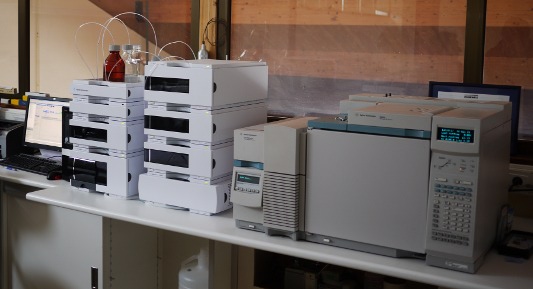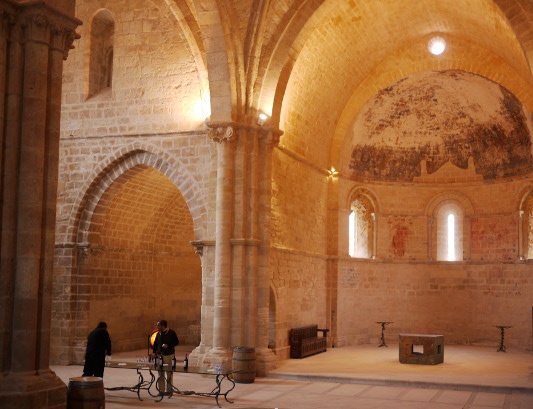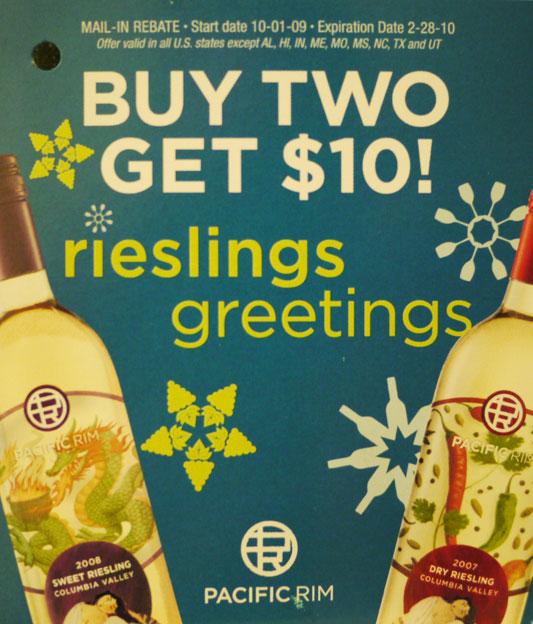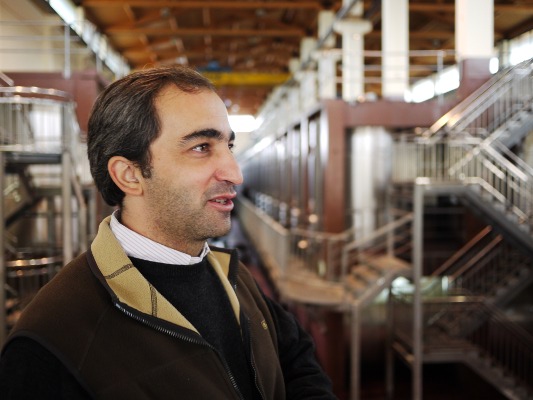Start Off Portland Right With The Farm Cafe
We arrived in Portland today in order to enjoy two days of rest and relaxation before we make our way north for the 2010 Wine Bloggers Conference.
I've started relying more and more on Yelp to help me pick where to eat when visiting somewhere new. Tonight it led me to The Farm Cafe, a superb vegetarian restaurant specializing in local, usually organic ingredients from small farms.
The meal started with asparagus fritters. They were deep-fried, but still light and airy, reminding me a bit of a pop-over. The fritters came with a horseradish creme fraiche that was so good I almost ate the leftovers with a spoon.
The entrée was a pan-fried Idaho trout that was both simple and spectacular. It was easily one of the best fish dishes I've ever had in a restaurant. Patrick, our waiter/bartender, told us that a customer liked it so much he ate the tail when he was done. Despite the portion being large, I was also tempted to eat the tail.
The dessert was a sunken chocolate soufflé with a molten center that was baked to order. It too was amazing, and the kitchen was nice enough to allow us to try both the coffee and the vanilla ice creams. Each ice cream comes from a different local vendor. If the presentation is a little off in this photo, it is only because I couldn't wait to dig my spoon in beforehand.
I also enjoyed a unique cocktail that was invented by the bartender, Patrick. It's called the LoBu Gimlet, and has a local gin, local mint, two fresh egg whites, some simple syrup, and a cucumber slice.
The total bill was only $41, and shockingly for this Californian, there was no sales tax. If the rest of Portland compares to this, it might be time for me to relocate.
Abadia Retuerta
Last year I was invited to visit three great wineries in Spain, in the Ribera del Duero region.
The first winery I visited was Abadia Retuerta. This was certainly the most advanced winery in terms of technology. It seems to be built into Abadia Retuerta's DNA; the winery is owned by Novartis, one of the largest pharmaceutical companies in the world.
Abadia's winemaker is Angel Anocibar. At Wine Future, I heard him referred to as an "egghead" by someone who had heard him speak before. I think it was meant as a compliment. Either that or jealousy. Once you've tasted their wines you'll realize that there is a lot to be jealous of.

Angel has a lot of advanced chromatography equipment from Agilent. The team uses it for many things, including to examine the quality of the barrels they bought. They then feed this information back to the barrel makers - ensuring Abadia Retuerta always gets the best barrels. I am sure that the barrel makers have nothing like this in their own factories.

Speaking of barrels, Abadia Retuerta does something else I've never seen before. They never move their barrels. Instead, the barrels are uniquely stacked. The wine goes in and the wine goes out, without ever having to move the barrel.
Using this much oak is fairly unique for Ribera del Duero. It's definitely not the normal style you find in the region.
The property has a twelfth century abbey that is absolutely stunning. They set up a wonderful private tasting for me inside.

Abadia Retuerta is in the process of turning the abbey into a twenty-two room hotel. This project should result in one of the nicer hotels in Europe. I've stayed at several top "Relais & Chateau" properties, but can't think of any that are really this nice structurally.
Abadia Retuerta's wines are very reasonably priced. All of their wines were great. I particularly liked their Cabernet Sauvignon, which is not a varietal I normally associate with the Ribera del Duero. Unfortunately, I can't seem to find that wine for sale in the United States. Luckily my local Costco has Abadia Retuerta's Seleccion Especial.
Summer Internship For A Python Programmer
Love wine and programming? We have the perfect opportunity for you this summer.
We're looking for an intern to help us add new features to 1000 Corks.
The right candidate will know most, but not necessarily all, of the following:
- Python. Of everything listed, this is probably the most important to know. But, if you're a great Ruby or Perl programmer who can learn Python quickly, that might be okay.
- SQL. We use PostgreSQL. But if you've used MySQL, it should be easy enough to figure out how things work. We've also started to use Redis, so understanding the whole NoSQL movement will be useful.
- JavaScript. Double bonus points if you've used jQuery.
- All those pesky web technologies: HTML, CSS, AJAX, and other relevant acronyms.
- Linux (we use Ubuntu), Apache, distributed version control (mercurial), etc.
We use TurboGears but don't necessarily expect you to have used that platform before.
We're hard at work making sure that 1000 Corks is the best wine search engine. This is a great chance to be part of that team. The founder's last company, Penguin Computing, became one of the largest and most successful Linux server companies in the world and changed the way supercomputing is done.

The internship comes with a stipend to cover your living expenses. The exact amount will be determined based on your knowledge and experience. But it should cover your basic living expenses.
You must spend the summer in the Santa Barbara area. No telecommuting. The internship runs from June 21 to September 10, 2010.
To apply please send email to jobs at 1000corks dot com with the subject "Python Summer Internship". (Hopefully that's enough of a clue that you can figure out the email address, but the spam bots can't.)
Please include your cover letter as the email body (in plain ASCII text). Attach your resume as a PDF.
This opportunity is open to anyone in the area, but we particularly encourage UCSB computer science students (both undergraduate and graduate students) to apply.
Pacific Rim For Only $2.99
Cost Plus World Market, one of our favorite places to go for good wines at great prices, has the 2008 Pacific Rim Sweet Riesling and the 2007 Pacific Rim Dry Riesling for $7.99 per bottle.
A rebate form attached to the bottle offers a $10 rebate when you buy two bottles, so if you fill it out properly you're only paying $2.99 plus tax for each.

Pay attention to the terms and dates of the rebate. For this particular offer, you'll need to fill out the rebate form, write the UPC numbers from the bottles on the original receipt, and include the receipt.
Pacific Rim is a winery owned by Randall Grahm. Randall's other winery is, of course, Bonny Doon.
Happy Savings!
Abadia Retuerta at Costco
I'm slowly working on an article about my visit to three wineries in the Ribera del Duero. Therefore, it was a nice surprise to see a bottle from one of the wineries I visited at my local Costco.

The wine is the 2006 Abadia Retuerta Seleccion Especial. It's priced at $15.99 at the Goleta (near Santa Barbara) Costco. I'm guessing they probably have it at all the Costcos that sell wine, or at least all the California Costcos but I don't know for sure.

Readers of this blog will remember Abadia Retuerta's sales manager, Alvaro, who was kind enough to share some of his favorite wines from the Wine Future show floor.
Champagne Specials
Speaking of great holiday buys, the only thing better than a bottle of champagne is a bottle of champagne and two free flutes.
Earlier this year Cost Plus World Market had Perrier Jouet with two glasses for $36.99. I went back a few days ago and it was gone. But today I saw it as Costco for $29.99. Rejoice!
On The Wine Future Floor
I'm having a great time at Wine Future in Rioja, Spain. It's the second and final day of the conference. I'm writing this up from the cafe in the basement, which I wish I'd discovered earlier.
There is a show floor where they are pouring wines from all around the world.
There are too many wines for me to try them all so I've asked Alvaro from Abadia Retuerta to help me by highlighting some of his favorites:
Frontaura Reserva 2005
Fine wood, great dark fruit background on a firm but gentle structure
Dominio de Valdepusa Petit Verdot 2004
Stands out for its singularity and ripeness
Finca Garbet 2006
An architecturally fantastic fresh wine made by great winemaker Delfi Sanahuja
Dr. Loosen
And the fantastic wines from Dr. Loosen... what "sweet terroir" wines!
Now for my favorites:
Domaine de la Coume du Roy, Maury, 1925
Yesterday it was whispered in my ear by Carlos de "corks can do no wrong" Jesus, that the South of France "delegation" was pouring a wine from 1925.
I found it yesterday, and it was good, but not great. I chalked it up mainly to having been too warm.
Today I tried it again - not having the opportunity to drink wines from 1925 all the time - and it was incredible, even though it was the same temperature. Sweet and wonderful, with a complexity that could only come after eighty or so years of aging.
The person manning the booth admitted that yesterday's bottle had been bad. Such is the danger of buying an eighty year bottle of wine. Especially since the retail cost must be, in this case, around $450 (a bargain, by the way, if you get a good bottle!)
Dr. Loosen Wehlner Sonnenuhr, Riesling Kabinett, 2008
Let me second Alvaro's recommendation for Dr. Loosen. You really, really have to like sweet wines to appreciate this one. Luckily I do! It's just on the edge of too sweet, but for me never becomes too cloying. Awesome!
Cartillo de Maetierra, Riesling, 2009.
These guys are bringing a "white revolution" to the Rioja. Including what they say is the first Riesling ever to be grown in Rioja. It's really good, and seems like a natural for the region. Would be a great wine to start any meal with. Just a hint of sweetness, and a bit of acidity, both in balance. It should be on the market in March of 2010, but I'm not sure if it will make the United States. 4000 Bottles. Around $10.
Terrunyo, Concha y Toro, Carmenere, 2006
I tasted every single wine in the Chilean booth (okay, so there were only six or so - not much of a hardship). This was my favorite wine in the booth. A very good demonstration of the beauty that is Carmenere.
The lower end Caremeneres from Concha y Toro are something that I often have over dinner at my house. It's always nice to have a higher end one to see just what this grape is capable of. And at around $30 it's still a bargain.
Seppeltsfield
The rather amazing Lisa Perrotti-Brown was nice enough to point out the Seppeltsfield booth to me yesterday, but I didn't taste them because I wanted to be fresh for the Robert Parker tasting later that day.
Today I got to them and they were as impressive as Lisa had hinted at. In particular I loved their port, made up of a bit of each vintage from 1878 onwards. Around $300.
And then there is the 1909. Named after the vintage the bottle contains, it is thick, wonderful, and nuanced as only a 100 year old wine can be. Primarily Mourvedre with perhaps a bit of Grenache and Shiraz. Around $300 for a very small bottle or $1000 for a larger one.

